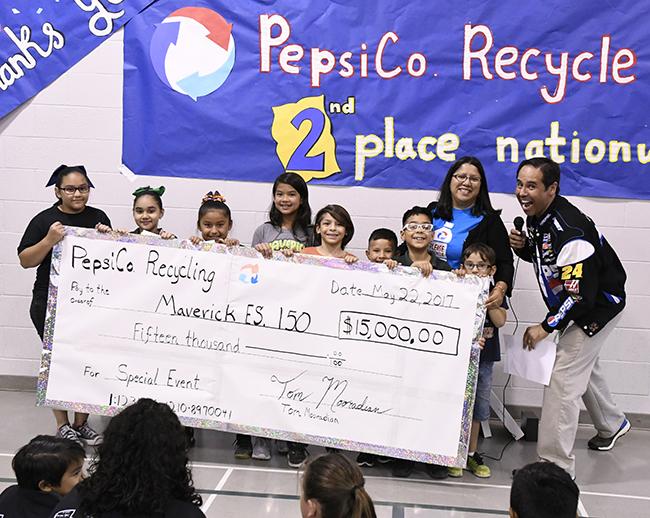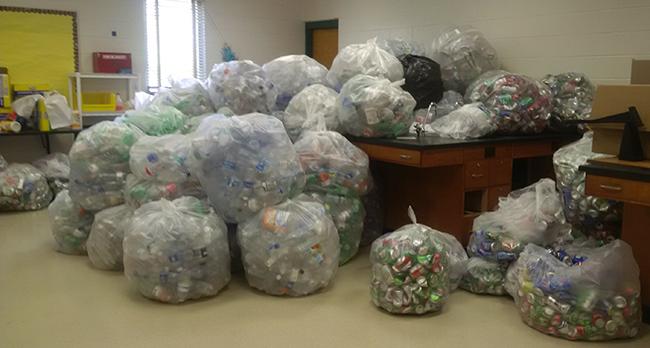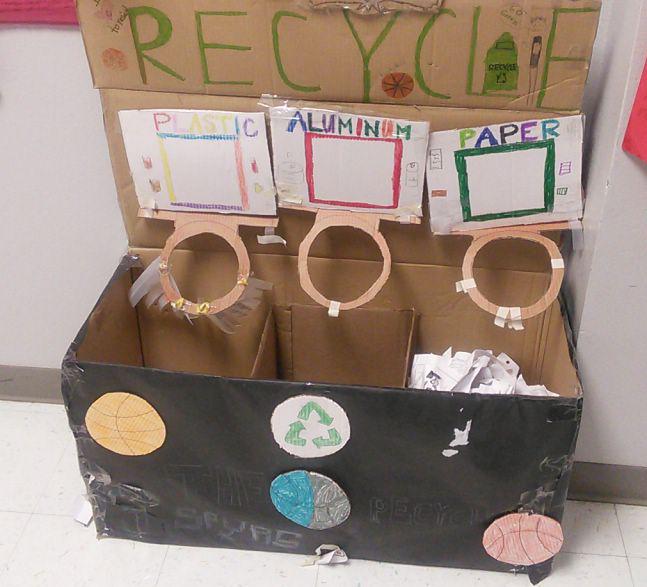Trick or Treating for Plastics, Diving Under Water, and Building a Bottle Mountain — These Two Schools Recycled 17 Million Bottles and Cans Last Year
Trick or Treating for Plastics, Diving Under Water, and Building a Bottle Mount…
David Culbreth and Paul Perea have never met - but their rivalry is as fierce, passionate, and maybe a little crazy as two teams battling for a championship.
Culbreth is principal at Fayetteville, N.C.’s Pine Forest High School, the winner of the 2016-2017 Recycle Rally.
Perea helped lead the effort at Maverick Elementary School in San Antonio, Texas.
Between the two of them (with, of course, a lot of help from their students and community), they were responsible for recycling nearly 17 million bottles and cans last school year.
Started in 2010, Recycle Rally has awarded over $1 million to schools around the country, which have recycled more than 100 million bottles or cans. Perhaps more importantly, it instills a sense of environmental responsibility in students that will carry forward long after they've left school.
"The students have been immersed in how important it is to recycle and be environmentally conscious," says Culbreth. "You take those concepts they are learning and add in a club atmosphere, and it becomes a social thing."
It certainly can have a unifying effect. At the end of last year, Perea, a music teacher, left Maverick and transferred to nearby Arnold Elementary School. While recruiting him, the new principal mentioned the school needed something to pull everyone together.
"It seemed like the morale was kind of low, but this is something kids can engage with,” he says. "I think of it as more spiritual."
It's working. While Pine Forest is in the lead again this year, Arnold is hot on its trail. And, even without Perea, Maverick is hardly out of the picture as well, making this a multifaceted rivalry.
"It's a different year, it's a different ball game," says Maverick principal Susan Correa. "Paul was a big force. So it's slower start for us, but I'm seeing things happen. ... We just keep trying to push each other.”
Meanwhile, she noted with a competitive snicker, “he's starting from scratch. He doesn't know it, but we're going to beat him this year."
It's that sort of drive that helped lead the schools to their impressive totals last year. Yet the numbers were so astonishing that even PepsiCo had trouble believing them.
"We thought at first they might be cheating," says Tom Mooradian, Manager, Environmental Sustainability at PepsiCo, with a laugh.
So how do schools manage to find that many bottles and cans to recycle?
Step one: It has to go much wider than just the school. Last year Pine Forest recruited the assistance of local golf courses and nearby schools that were either not participating or well out of contention. Students and faculty took to the radio to publicize their cause. The school partnered with the nearby Ft. Bragg military base. And it begged parents to let them bring in their recyclables from home.
This year, in addition to repeating all of that, they've also built a large area in the back of the school for people throughout the community to drop off recyclables. (At this point, all of Fayetteville is hoping for back-to-back wins.)
At Arnold, Perea is reaching out to nearby corporations for help and also taking cans and bottles from his local golf course.
And there’s more: One teacher who's a diver has started looking for cans and bottles underwater. Others find themselves checking every trash can to make sure there's nothing they can use in there.
And on Halloween, some Arnold students trick-or-treated for recycling, asking for bottles and cans instead of candy. (They took candy too, though. These are kids, after all.)
Maverick, meanwhile, has parents dropping off recyclables when they drop off their kids each morning. And, like Arnold, has relationships with area businesses and churches to help it move higher in the standings.
Recycle Rally has become a popular competition in schools for years, but things have really taken off since 2014. That year, 299 schools participated in the contest. In 2017, more than 3,000 are. That means roughly one out of every 50 schools in the country are enrolled in the program.
And in 2016-2017, the program saved enough energy through recycling to avert the amount of greenhouse gases equal to that of a forest of 71,000 trees for 10 years.
Winning schools get a $20,000 cash prize to improve their campus. Second place gets $15,000 and third gets $10,000. (Cash prizes are awarded to schools down to 25th place.)
That's a notable incentive. (Neither Pine Forest or Maverick has made a final decision on what they plan to do with last year's winnings yet.) And it's something educators can use to motivate students. Some schools hold contests between the grades (with the winner getting a pizza party or extra recess time).
And last year, when Maverick was closing in on Pine Forest, Culbreth says "I kept telling the kids 'You can't get beat by a bunch of elementary students'."
For Perea, who thought he might have a hard time motivating parents when he transferred, the mention of the $20,000 prize was all it took. Today, parents are as active in the collection as school officials.
That's only spurring the friendly rivalry, with each school happy to do a little trash talking - and looking to find new ways to increase their can and bottle count - though, as any good coach would, they're keeping a few of their best plays secret.
“We're definitely using better methods this year than we were last year," says Culbreth. "But I don't want to talk about them. I don't want Arnold Elementary learning our tricks and surging ahead of us."




